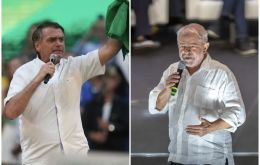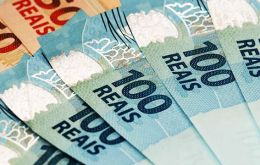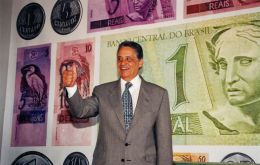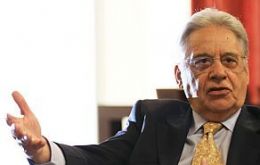MercoPress. South Atlantic News Agency
Tag: Henrique Fernando Cardoso
-
Wednesday, August 17th 2022 - 09:27 UTC
Brazilian presidential campaign takes off: Lula and Fernando Cardoso have joined forces to oust Bolsonaro

The most polarized Brazilian presidential campaign in recent years was officially launched on Tuesday with ex-president Lula da Silva leading comfortably incumbent Jair Bolsonaro in opinion polls. But opinion polls in Brazil have not been very precise in recent elections and the Brazilian government still has too many resources at hand.
-
Thursday, July 4th 2019 - 08:02 UTC
Brazil's currency Real turned 25 this month, a true feat for a country whipped for decades with inflation

Brazil’s Real turned 25 years on Monday, July first. It’s already the longest circulating currency in the contemporary history of Brazil, having achieved this feat without fanfare in 2018 when it surpassed the cruzeiro.
-
Thursday, July 17th 2014 - 05:24 UTC
Brazil’s main October presidential battle will take place in Sao Paulo

When opposition party Senator Aecio Neves officially kicked off his presidential campaign last week, he posted a video on Facebook calling for a “fairer, more efficient, and more generous Brazil”. However the word ‘efficient’ struck some as an odd rallying cry in a tropical country known for its, well, un-Swiss-like approach to time.
-
Wednesday, July 2nd 2014 - 07:27 UTC
Two decades of the Real, the currency that helped Brazil trust financial stability

Twenty years ago, first July 1994, after decades of financial turmoil, Brazil introduced its current currency, the Real, marking a turning point in the country's fight against hyperinflation.
-
Saturday, April 12th 2014 - 08:59 UTC
Brazilian police investigation into money laundering includes Petrobras

Brazil's Federal police confirmed on Friday that it had orders from a Parana federal judge to raid Petrobras offices in search of documentation related to an alleged major money laundering scheme but it was not necessary because of the collaboration from the country's largest oil and gas corporation officials.
-
Tuesday, May 8th 2012 - 02:06 UTC
Mercosur “needs to be reborn” with an honest integration spirit, says Cardoso

Brazilian former president Fernando Henrique Cardoso said that Mercosur “needs to be reborn but with a real integration spirit among its members” leaving behind such ambitions as the mirror of the European Union.
